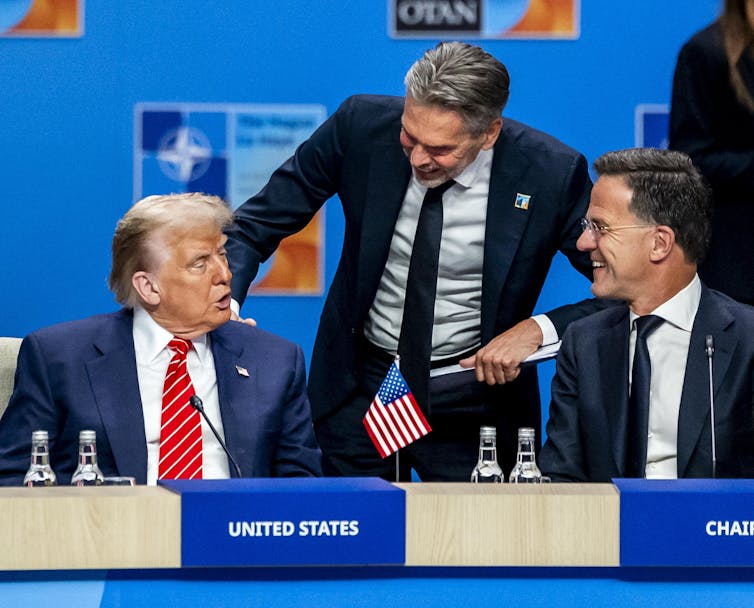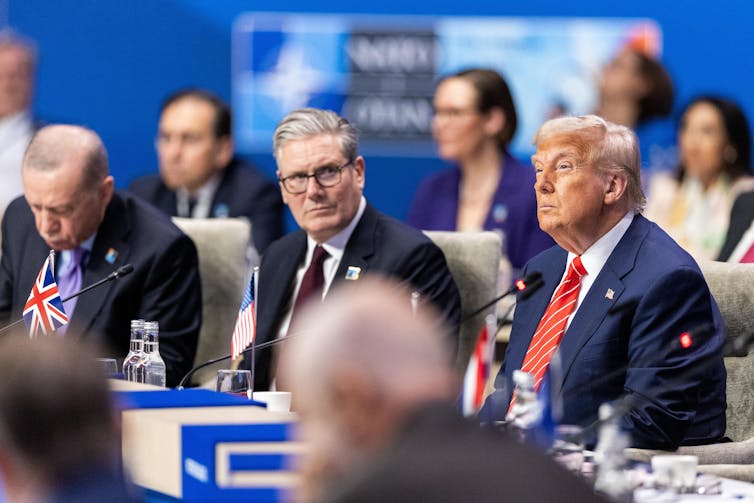Donald Trump is a difficult figure to deal with, both for foreign leaders and figures closer to home who find themselves in his crosshairs. The US president is unpredictable, sensitive and willing to break the rules to get his way.
But in Trump’s second term, a variety of different leaders and institutions seem to have settled on a way to handle him. The key, they seem to think, is flattery. The most obvious example came at the recently concluded Nato summit in The Hague, Netherlands, where world leaders got together to discuss the future of the alliance.
Previous summits with Trump have descended into recrimination and backbiting. The organisers were determined to avoid a repeat – and decided the best way to do it was to make Trump feel really, really good about himself.
Even before the summit began, Nato secretary-general Mark Rutte had texted Trump to thank him for his “decisive action” in bombing Iran. This, he said, was something “no one else dared to do”.
Then, when discussing Trump’s role in ending the war between Israel and Iran, Rutte referred to Trump as “daddy” – a name the White House has already transformed into a meme.

Remko de Waal / EPA
The summit itself was light on the sort of contentious and detailed policy discussions that have historically bored and angered Trump.
Instead, it was reduced to a series of photo opportunities and speeches in which other leaders lavished praise on Trump. Lithuania’s president, Gitanas Nausėda, even suggested the alliance ought to copy Trump’s political movement by adopting the phrase “make Nato great again”.
Nato leaders aren’t the only ones trying this trick. British prime minister Keir Starmer has had a go at it too. Starmer has made sure that Trump will be the first US president to make a second state visit to the UK. He described the honour in Trump-like terms: “This has never happened before. It’s so incredible. It will be historic.”
After Trump announced global trade tariffs earlier in the year, Starmer was the first leader to give Trump a much-needed victory by reaching a framework trade agreement. But it worked both ways, with Starmer able to land a political victory too.
In his first term, flattery was also seen as a tool to be used to get Trump onside. Ukraine’s Volodymyr Zelensky tried it in phone conversations with the US president, calling him a “great teacher” from whom he learned “skills and knowledge”.
Flattery and compliance clearly have their uses. Trump is extremely sensitive to criticism and susceptible to praise, however hyperbolic and transparent it might be. Buttering him up may be an effective way to get him to back off.
But it doesn’t achieve much else. At the Nato summit, an opportunity was missed to make progress on issues of real importance, such as how to better support Ukraine in its war against Russia or to better coordinate European defence spending.
A summit dedicated to the sole aim of making Trump feel good is one with very limited aims indeed. All it does is push the difficult decisions forward for another day.
A missed opportunity
Individual decisions to bow down to Trump also mean missing the opportunity to mount collective resistance. One country might not be able to stand up to the president, but the odds of doing so would be greatly improved if leaders banded together.
For example, Trump’s trade tariffs will damage the US economy as well as those of its trading partners. That is especially the case if those partners impose tariffs of their own on US goods.
If each country instead follows Britain’s lead in the hope of getting the best deal for itself, they will have missed the opportunity to force the president to feel some discomfort of his own – and possibly change course.
But perhaps the greatest danger of flattering Trump is that it teaches him that he can get away with doing pretty much whatever he likes. For a president who has threatened to annex the territory of Nato allies Denmark and Canada to nevertheless be feted at a Nato summit sends a message of impunity.
That’s a dangerous lesson for Trump to learn. He has spent much of his second term undermining democratic and liberal norms at home and key tenets of US foreign policy abroad, such as hostility to Russia. He is attempting to undermine all traditional sources of authority and expertise and instead make the world dance to his own tune.

Sem van der Wal / EPA
Given the expansive scope of his aims, which many experts already think is leading to a constitutional crisis that threatens democracy, the willingness to suck up to Trump normalises him in a menacing way.
When his targets roll over, it sends a message to others that Trump is unstoppable and resistance is futile. It encourages not just the next presidential abuse of power, but also the next surrender from those he chooses to attack.
Perhaps the best that can be said for this strategy is that maybe it will appease Trump enough to prevent him from doing too much actual harm. But when dealing with such an unpredictable and vindictive president, that is a thin reed of hope.
It is much more likely to encourage him to press on – until the harm becomes too severe to ignore.




